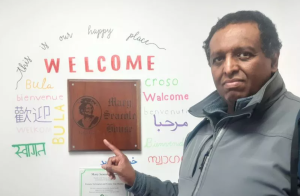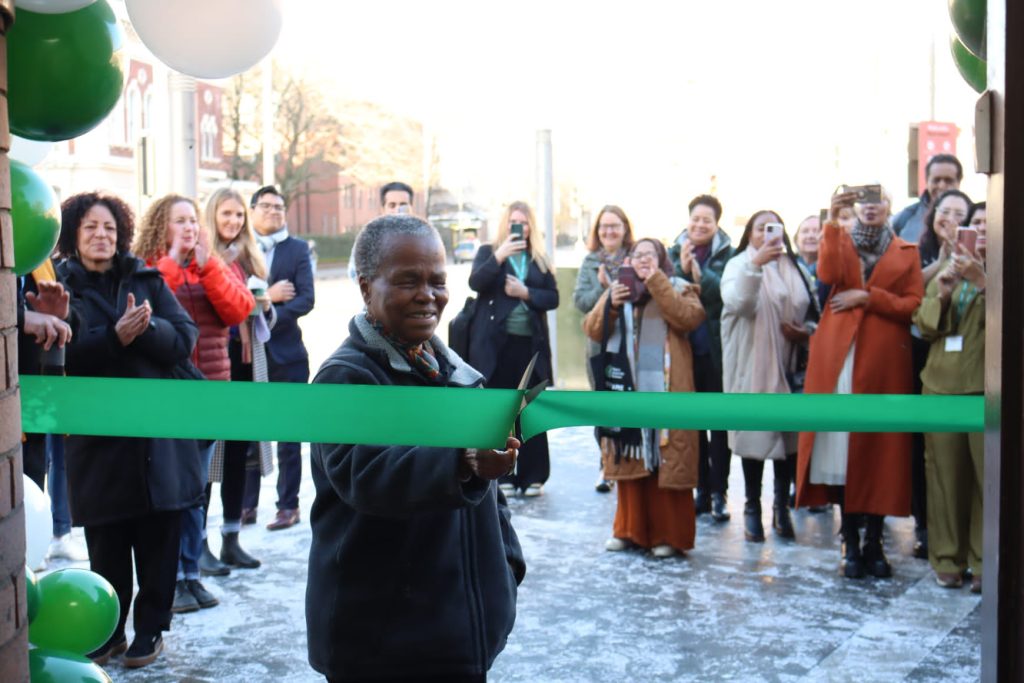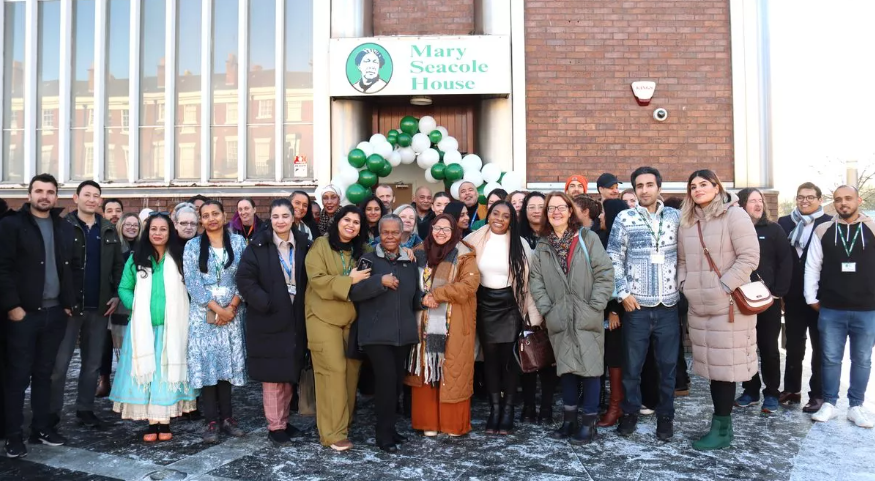
Mohammed Abdi feels protected by charity Mary Seacole House that he has used for 12 years (Image: Patrick Graham/Liverpool ECHO)
A man has thanked a charity for helping him in his hour of need and making him feel “protected”.
Mohammed has been going to Mary Seacole House (MSH) for the last 12 years because “it’s essential”. MSH opened in April 1991 to cater for Black and minority service users who faced discrimination within the mental health service.
The 57-year-old worked for Merseyside Fire Service (MFS) as an electrical technician from 1987 and became a firefighter from 2001 – 2003. Abdi first experienced mental health problems over 20 years ago during his time with the MFS.
Abdi told the ECHO: “I started to talk to myself when I was a technician. Initially I was able to hide it.
“I got to a point where I could not hide it. That didn’t help my overall situation in the long term as the pressure and stress was too much going into burning buildings”.
Abdi also struggled with the training in keeping himself fit. He found he could train to a certain level, but it was different being a firefighter and having to maintain a certain fitness.
“It’s not enough to drag people out of a building or do the job properly. At that time I had no support and was not accessing any mental health services.
“Three or four months after I left I got the chance for a doctor to assess me. They said yes you need to go to hospital, you have schizophrenia.
“I was like what, and they sectioned me. I was there for 28 days for an assessment and they said “yes you’re suffering from it and believe you’re suffering from depression as well”.
He added: “When I was sectioned, it was horrible. I was dazed and a bit confused.”
Abdi was sectioned a few times and found the experiences unpleasant. There were no staff who looked like him and not enough to cater for his cultural needs.
He said: “Ethnic minorities are more cultural and understand the pitfalls of society. There are a lot of people that give you a false face and then they do you behind your back”.

Protasia Torkington a founder member of mental health charity Mary Seacole House cuts the ribbon to open their new building in Toxteth on January 18 (Image: Nisha Mundekad/Mary Seacole House)
The reason MSH formed in 1991 was due to disparities in the provision of mental health services when dealing with people from Black and minority backgrounds in the UK. The MSH website said: “People experiencing racial inequalities who were diagnosed with mental illness did not have facilities in the community to support them and often ended up being sectioned and placed far away from their families and communities. Many of them were misdiagnosed and unfairly treated.”
These issues have not gone away as highlighted in the government’s Mental Health Act Reform – Race and Ethnic Inequalities report (May 2022). It states they set out to tackle historical disparity in the treatment of people from racial minority backgrounds. According to NHS mental health statistics 2020-21 (updated November 2023) Black people are just over four times more likely than their white counterparts to experience compulsory detention using mental health legislation.
A MSH founder member Protasia Torkington said: “If you are a Black person and you go and say I’m experiencing depression, you could be taken to hospital as a mentally ill person.
“An organisation like this is absolutely wonderful where people can walk in and feel they can discuss their problems without being seen as mentally ill. Even though we suffered racism and everything else, it was as if we are not allowed to be depressed about our situation”.
Founders noted Black people were too easily diagnosed and stereotyped as dangerous and sectioned. With the forming of MSH, support and advocacy there was a fall in the numbers being sectioned.
Protasia said: “Stereotypes of Black people will always be there, but not many in terms of numbers will be sectioned if you come to Mary Seacole. Doctors are now sending patients to MSH to talk, there is representation and advocacy behind them to say this is not a case that needs to be sectioned”.

Pro
Protasia Torkington (front centre) a founder member of mental health charity Mary Seacole House with staff, volunteers, service users and members of the public outside their new building in Toxteth. (Image: Nisha Mundekad/Mary Seacole House)
MSH advocacy project worker Simon added: “The advocacy and MSH is important because of the abuse Black people suffer when they get to that level and end up going to prison rather than hospital. They end up over medicated when they do get into hospital and are criminalised by the system.
“The system is set up for a white British population. They don’t make the changes that need to be made for the different people within the system.
“Effectively it can be as simple as what food you’re offered. Your dietary requirement, understanding people’s belief system, where they come from or their background”.
MSH has moved from its rented space in the Kuumba Imani Centre, which housed a number of organisations, and taken over the old NatWest Bank on Princes Road which officially opened on January 18. Simple projects and events, at times, were not possible due to how they may impact other organisations in the Kuumba building.
MSH manager Fouzia Hinchliffe said: “Having your own building gives you the sense of freedom and belonging. Now we can open whenever we want.
“We have that family atmosphere which makes it OK to talk about issues. It’s confidential and safe. People are confident to come here, share their problems and are happy to be here”.
Abdi continued: “I feel protected by Mary Seacole as you have Simon in the back, at the side of the ring so to speak. I’m not dangerous, they know I have a certain intellect and I’m not stupid cos I don’t use brawn, I use my brain.
“The service they provide it’s essential. It’s a great service”.
Mersey Care commissioned a patient study between 2018 and 2022, which prompted their commitment to actively focus on race equality in their service. A Mersey Care NHS Foundation Trust spokesman said: “Mersey Care is aware of historical inequalities in the greater likelihood of Black people being detained under the Mental Health Act, which is why it is an active focus within our Trust to prevent it happening within our services and for the communities we serve.
“We’ve long recognised racial inequalities and launched a campaign in 2022 to become an anti-racist organisation. This recognises being non-racist was not enough, so we committed to becoming actively anti-racist, by identifying and opposing racism in our everyday actions and behaviours.
“Our response has been to adopt NHS England’s Patient and carer race equality framework, launched last year and aims to eliminate the unacceptable racial disparity in the access, experience and outcomes (AEO) of Black communities and significantly improve their trust and confidence in mental health services.
“Some practices we’ve introduced include enhanced data monitoring of different racial profiles and working closely with ethnically diverse groups to ensure their experience and feedback drives the changes we aim to implement within our services. We aim to learn from people with lived experience, and co-production to ensure the delivery of service matches our communities’ needs.”
Read the article via the Liverpool Echo Website
